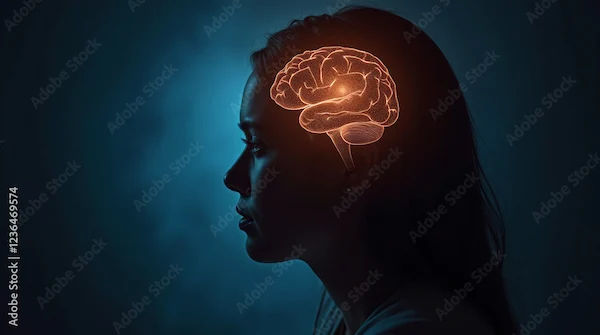Mental and Behavioural Health: A Psychiatrist's Guide to Overcoming Insomnia
Know about mental and behavioural health, what it is, what insomnia is, types, and the physical domino effect, sleeplessness problem and remedy for insomnia and more.


Introduction
Staring at the ceiling at 3 AM, your mind racing while the world sleeps, is a uniquely frustrating experience. But what if your sleepless nights were doing more than just making you tired? Insomnia is far from a simple inconvenience; it's a significant mental health and behavioural concern that can trigger a devastating cascade of effects on your entire well-being. This article, guided by the principles of behavioural sciences, delves into the profound connection between chronic sleep loss and your psychological and physical health. We will explore the science behind why you can't sleep, the alarming consequences of sleep deprivation, and most importantly, evidence-based strategies from psychiatry to help you break the cycle and reclaim the restful nights you deserve.
What Are Mental and Behavioural Health Sciences?
Mental health and behavioural health are often used interchangeably, but they have distinct, overlapping meanings. Think of mental health as primarily focusing on the internal state—your emotional, psychological, and social well-being. It involves your thoughts, feelings, and biological factors that contribute to conditions like depression or anxiety. Behavioural health, a broader term, looks at the visible actions and habits that impact your well-being. This includes everything from sleep patterns and eating habits to substance use and how we manage stress. The field of behavioural sciences is the academic engine that studies these actions, using psychology, neuroscience, and sociology to understand why we do what we do.
Consult a Neurologist for Personalised Advice
The Mind-Behaviour Connection
The core principle is that our thoughts influence our behaviours, and our behaviours, in turn, reinforce our thoughts. For example, a person with anxiety (mental) might avoid social gatherings (behaviour). This avoidance temporarily reduces anxiety, reinforcing the behaviour, but ultimately strengthens the belief that social situations are threatening, worsening the mental anxiety over time. This creates a feedback loop that behavioural health professionals are trained to disrupt.
How Behavioural Sciences Decode Our Actions
By applying principles from behavioural sciences, experts can identify maladaptive patterns. In the context of insomnia, a person might develop a behaviour of lying in bed for hours trying to force sleep, which leads to associating the bed with anxiety and frustration instead of relaxation. This is a classic behavioural pattern that perpetuates the problem. Understanding this allows for targeted interventions that address not just the feeling of sleeplessness, but the actions surrounding it.
Insomnia: More Than Just Sleeplessness
Everyone has a bad night of sleep occasionally. Clinical insomnia, however, is a persistent disorder that impairs daytime functioning. It’s characterised by consistent difficulty with sleep initiation, duration, consolidation, or quality, despite having adequate opportunity for sleep.
Defining Clinical Insomnia
For a formal diagnosis, the sleep difficulties must occur at least three nights per week for at least three months and cause significant distress or functional impairment in areas like work, school, or social interactions. It’s not defined by a specific number of hours slept, as sleep needs are individual, but by how you feel and function during the day.
The Two Types of Insomnia You Should Know
1. Primary Insomnia
This means your sleep problem isn’t directly linked to any other health condition or physical cause. It exists on its own, often rooted in behavioural patterns and cognitive factors like excessive worry about sleep.
2. Secondary Insomnia
This is sleeplessness, which is a symptom or a side effect of another issue. This could be a mental health condition (like depression or PTSD), a physical ailment (like chronic pain or asthma), a medication, or a substance (like caffeine or alcohol).
The Vicious Cycle: How Insomnia Wreaks Havoc on Your Mental Health
The relationship between sleep and mental health is profoundly bidirectional. Poor sleep can be both a cause and a consequence of mental health disorders, creating a vicious cycle that can be difficult to break.
Insomnia and Anxiety: A Two-Way Street
This is one of the most common cycles. Anxiety makes it hard to fall asleep because your nervous system is in a state of high alert. Then, the resulting sleep deprivation amplifies the brain's anticipatory reactions, making you more emotionally reactive and prone to anxiety the next day. You may start to develop "sleep performance anxiety," where the pressure to fall asleep itself becomes a source of anxiety, perpetuating the insomnia.
The Link Between Sleep Deprivation and Depression
Studies show that people with insomnia have a tenfold risk of developing depression compared to those who sleep well. During deep sleep, the brain processes emotional information and restores itself. Without it, the negative emotional circuits of the brain become more active, while the rational, moderating centres (like the prefrontal cortex) become less effective. This neural imbalance fuels the feelings of sadness, hopelessness, and lack of energy characteristic of depression.
How Poor Sleep Fuels Irritability and Mood Swings
Ever noticed you're more snappy and short-tempered after a bad night's sleep? This isn't just in your head. Sleep deprivation dulls the brain's ability to regulate emotions. The amygdala (the emotional centre) becomes overactive, while its connection to the prefrontal cortex (the rational centre) weakens. This means you’re more likely to have an exaggerated emotional response to minor stressors, leading to significant mood swings and interpersonal difficulties.
If your sleep struggles are contributing to persistent anxiety or low mood, it's crucial to consult a professional. You can consult a psychiatrist online with Apollo24|7 for a confidential evaluation and personalised advice.
The Physical Domino Effect: What Chronic Sleeplessness Does to Your Body
The impact of insomnia extends far beyond the brain, triggering a cascade of physical health problems.
Weakened Immune System and Increased Illness
During sleep, your body produces cytokines, proteins that target infection and inflammation. Sleep deprivation compromises this process, making you more susceptible to common illnesses like the flu and colds. Long-term, chronic inflammation is linked to a higher risk for numerous health conditions.
Weight Gain and Metabolic Mayhem
Poor sleep disrupts the hormones that regulate appetite. It causes ghrelin (the "hunger hormone") to spike and leptin (the "satiety hormone") to drop. This dual effect means you feel hungrier and less full, often leading to cravings for high-calorie, high-carbohydrate foods. Furthermore, insomnia can lead to insulin resistance, a precursor to type 2 diabetes.
Cardiovascular Risks: The Heart of the Matter
Consistent, quality sleep is essential for healing and repairing your heart and blood vessels. Sleep deprivation is associated with increased blood pressure, higher levels of stress hormones like cortisol, and elevated markers of inflammation, all of which are risk factors for heart disease and stroke.
Cognitive Consequences: When Your Brain Doesn't Sleep
Sleep is essential for cognitive maintenance. Without it, your brain's executive functions begin to falter.
Memory Lapses and Impaired Learning
Sleep, particularly the REM stage, is critical for memory consolidation—the process of transferring short-term memories into long-term storage. When you're sleep-deprived, this process is disrupted, leading to forgetfulness and difficulty retaining new information. This is why "pulling an all-nighter" is actually a poor strategy for exam preparation.
The Impact on Concentration and Focus
The tired brain struggles to focus its attention. You may find your mind wandering during tasks, making it difficult to concentrate at work or school. This reduced vigilance can also be a safety hazard, significantly increasing the risk of accidents, especially while driving.
Poor Decision-Making and Reduced Performance
A sleep-deprived prefrontal cortex leads to impaired judgment. You may become more impulsive, have difficulty assessing risks, and struggle with complex problem-solving. This can lead to poor decisions both professionally and personally, and a general decline in performance across all activities.
Proven Strategies from Behavioural Science to Reclaim Your Sleep
The good news is that you can break the cycle. The most effective long-term solutions come from behavioural health interventions.
Cognitive Behavioural Therapy for Insomnia (CBT-I)
CBT-I is the gold-standard non-pharmacological treatment for chronic insomnia. It's a structured program that helps you identify and replace thoughts and behaviours that cause or worsen sleep problems with habits that promote sound sleep. It involves:
- Cognitive Therapy: Challenging and changing negative beliefs about sleep (e.g., "I'll never get to sleep").
- Behavioural Techniques: Including those listed below.
Mastering Sleep Hygiene for Better Rest
This involves optimising your habits and environment for sleep.
- Schedule: Go to bed and wake up at the same time every day, even on weekends.
- Environment: Keep your bedroom cool, dark, and quiet. Reserve your bed only for sleep and sex.
- Routine: Develop a relaxing pre-sleep ritual (e.g., reading a physical book, taking a warm bath).
- Avoid: Caffeine, nicotine, and large meals close to bedtime. Limit screen time an hour before bed.
Mindfulness and Relaxation Techniques
Practices like meditation, deep breathing exercises, and progressive muscle relaxation can calm the nervous system and reduce the anxiety that prevents sleep. These techniques help you observe your thoughts and worries without reacting to them, allowing your body to transition into a state conducive to sleep.
When to Seek Professional Help for Sleep Issues
While improving sleep hygiene is a great first step, it's not always enough. You should consider seeking help from a mental health or behavioural health professional if:
Red Flags That It's Time to See a Doctor
Your sleep problems occur at least three nights a week for more than three months.
Daytime fatigue is causing significant distress or impairing your work, driving, or social functioning.
You find yourself relying on sleep aids or alcohol to fall asleep.
You suspect your insomnia is linked to an underlying condition like depression, anxiety, or sleep apnea (e.g., loud snoring, gasping for air during sleep).
If symptoms persist beyond two weeks despite your best efforts, consult a doctor online with Apollo24|7 for further evaluation. They can help determine if you need a referral to a sleep specialist or psychiatrist.
Conclusion
Ignoring chronic insomnia is akin to ignoring a persistent alarm bell from your body and mind. As we've explored, the consequences extend far beyond simple fatigue, seeping into your emotional stability, physical health, and cognitive sharpness. The principles of behavioural health teach us that the patterns we enact around sleep are powerful determinants of our well-being. The cycle of sleeplessness, anxiety, and poor health can feel inescapable, but it is not. By understanding this connection, you empower yourself to take action.
Consult a Neurologist for Personalised Advice
Consult a Neurologist for Personalised Advice

Dr. Aditendraditya Singh Bhati
Neurosurgeon
21 Years • MBBS(2004), DNB Neurosurgery(2014); MNAMS; Fellow Skull Base Endoscopy (Italy), Fellow Extended Skull Base ( Weill Cornell, USA), Fellow ZAP-X Radiosurgery. Member of American Association of Neurological Surgeons
Delhi
Apollo Hospitals Indraprastha, Delhi
(100+ Patients)

Dr. Ganeshgouda Majigoudra
Neurologist
10 Years • MBBS, MD ( GENERAL MEDICINE) DM (NEUROLOGY)
Bengaluru
Apollo Clinic, JP nagar, Bengaluru

Dr. E Prabhakar Sastry
General Physician/ Internal Medicine Specialist
40 Years • MD(Internal Medicine)
Manikonda Jagir
Apollo Clinic, Manikonda, Manikonda Jagir
(150+ Patients)

Dr Debnath Dwaipayan
Neurosurgeon
9 Years • MBBS, MS(Gen. Surgery), DrNB (Neurosurgery)
Delhi
Apollo Hospitals Indraprastha, Delhi

Dr S Selvin
Neurologist
10 Years • MBBS, MD, DM (Neurology), FINR fellowhsip in Interventional Neuro Radiology
Chennai
Apollo Speciality Hospitals Vanagaram, Chennai
Consult a Neurologist for Personalised Advice

Dr. Aditendraditya Singh Bhati
Neurosurgeon
21 Years • MBBS(2004), DNB Neurosurgery(2014); MNAMS; Fellow Skull Base Endoscopy (Italy), Fellow Extended Skull Base ( Weill Cornell, USA), Fellow ZAP-X Radiosurgery. Member of American Association of Neurological Surgeons
Delhi
Apollo Hospitals Indraprastha, Delhi
(100+ Patients)

Dr. Ganeshgouda Majigoudra
Neurologist
10 Years • MBBS, MD ( GENERAL MEDICINE) DM (NEUROLOGY)
Bengaluru
Apollo Clinic, JP nagar, Bengaluru

Dr. E Prabhakar Sastry
General Physician/ Internal Medicine Specialist
40 Years • MD(Internal Medicine)
Manikonda Jagir
Apollo Clinic, Manikonda, Manikonda Jagir
(150+ Patients)

Dr Debnath Dwaipayan
Neurosurgeon
9 Years • MBBS, MS(Gen. Surgery), DrNB (Neurosurgery)
Delhi
Apollo Hospitals Indraprastha, Delhi

Dr S Selvin
Neurologist
10 Years • MBBS, MD, DM (Neurology), FINR fellowhsip in Interventional Neuro Radiology
Chennai
Apollo Speciality Hospitals Vanagaram, Chennai
More articles from Mental Health
Frequently Asked Questions
How many hours of sleep do I actually need?
Most adults need 7-9 hours of quality sleep per night. However, quality (uninterrupted, deep sleep) is just as important as quantity. It's about how rested you feel during the day.
Can I ever 'catch up' on lost sleep?
While sleeping in on weekends can help pay off a short-term 'sleep debt,' it doesn't fully reverse the effects of chronic sleep deprivation. It can also disrupt your circadian rhythm, making it harder to sleep Sunday night. Consistency is key.
Are sleeping pills a safe long-term solution for insomnia?
Most over-the-counter and prescription sleep medications are intended for short-term use (a few weeks). They can cause dependence, tolerance, and side effects. CBT-I is recommended for long-term management as it addresses the root causes without medication.
What's the difference between a psychiatrist and a psychologist in treating sleep issues?
A psychiatrist is a medical doctor who can diagnose conditions, prescribe medication (if needed for underlying anxiety/depression), and provide treatment. A psychologist typically provides psychotherapy, such as CBT-I. Often, they work together for comprehensive care.
I've always been a 'bad sleeper.' Is it too late to change?
It is never too late to improve your sleep. The brain retains plasticity, meaning you can learn new, healthier sleep behaviours and thought patterns at any age through techniques like CBT-I.




